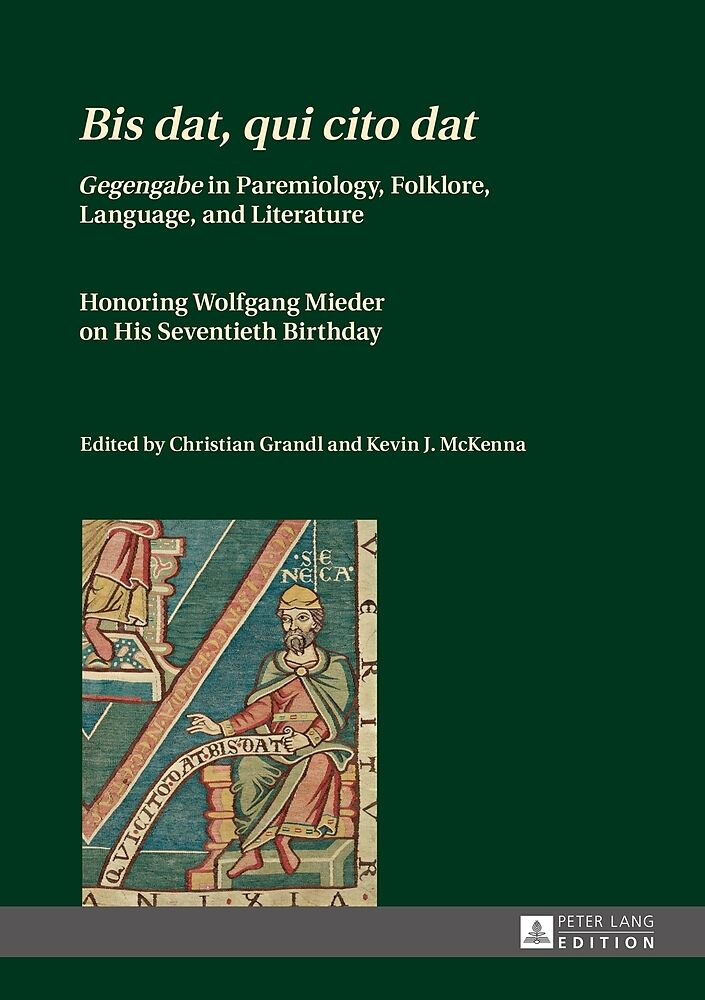«Bis dat, qui cito dat»
Einband:
Fester Einband
EAN:
9783631648728
Untertitel:
«Gegengabe» in Paremiology, Folklore, Language, and Literature Honoring Wolfgang Mieder on His Seventieth Birthday
Herausgeber:
Peter Lang
Anzahl Seiten:
788
Erscheinungsdatum:
10.09.2015
ISBN:
3631648723
This international festschrift volume contains sixty-six essays in six languages contributed by seventy-one friends and colleagues, acknowledged experts from various fields of research. It is representative of the scope and breadth of Wolfgang Mieder's impressive scholarship in paremiology, folklore, language, and literature.
Bis dat, qui cito dat never has a proverb more aptly applied to an individual than does this Medieval Latin saying to Wolfgang Mieder. «He gives twice who gives quickly» captures the essence of his entire career, his professional as well as personal life. As a Gegengabe , this international festschrift honors Wolfgang Mieder on the occasion of his seventieth birthday for his contributions to world scholarship and his kindness, generosity, and philanthropy. Seventy-one friends and colleagues from around the world have contributed sixty-six essays in six languages to this volume, representative of the scope and breadth of his impressive scholarship in paremiology, folklore, language, and literature. This gift in return provides new insights from acknowledged experts from various fields of research.
Autorentext
Christian Grandl is an Egyptologist and Paremiologist. He has published several articles in journals related to Egyptological and Paremiological Studies.
Kevin J. McKenna is Professor of Russian Language, Literature and Culture in the Department of German and Russian at The University of Vermont (USA). He is the editor of another Festschrift, (co-)author of three books and numerous articles published in journals related to Russian and Soviet Studies.
Klappentext
Bis dat, qui cito dat never has a proverb more aptly applied to an individual than does this Medieval Latin saying to Wolfgang Mieder. «He gives twice who gives quickly» captures the essence of his entire career, his professional as well as personal life. As a Gegengabe, this international festschrift honors Wolfgang Mieder on the occasion of his seventieth birthday for his contributions to world scholarship and his kindness, generosity, and philanthropy. Seventy-one friends and colleagues from around the world have contributed sixty-six essays in six languages to this volume, representative of the scope and breadth of his impressive scholarship in paremiology, folklore, language, and literature. This gift in return provides new insights from acknowledged experts from various fields of research.
Inhalt
Contents: Pedro Martins: Der Mann hinter den Sprichwörtern: Ein Interview mit Wolfgang Mieder Tamar Alexander/Yaakov Bentolila: Judeo-Spanish Haketic Proverbs from Northern Morocco: Sources and Studies Bo Almqvist - Translated by Marcas Mac Coinnigh: The Crab's Walk: Wellerism and Fable (AT 276) Shirley L. Arora: «Crossover» Proverbs: Spanish to English? Saa Babi: Proverbial Advice Dealing with One's Health Peter Barta: Parent-Child Relationships in French Proverbs Chilukuri Bhuvaneswar: The Proverb and Its Definition: A Ka:rmik Linguistic Approach Frantiek ermák: Wisdom in Proverbs Chu-Hsien Chen: A Teacher for One Day, a Father for a Whole Lifetime: A Selection of Taiwanese Proverbs About Teachers Christoph Chlosta/Peter Grzybek: Zum Teufel mit dem : Anfang und Ende in der experimentellen Parömiologie Charles Clay Doyle: Rules Are Rules: Maxims in Our Time Wolfgang Eismann: Blasons populaires im Dienste der Fremdenfeindlichkeit: Juraj Krianis Gebrauch von Sprichwörtern und Redensarten in seiner Politika Liisa Granbom-Herranen: Suomalaisen sananlaskututkimuksen aikakaudet Pekka Hakamies: The Face Behind the Text: A Collection of Russian Proverbs by an Unknown Collector Galit Hasan-Rokem: Negotiating Canons: Rabbinic Proverbs Between Oral Tradition and Scripture Hrisztalina Hrisztova-Gotthardt: « »: Sprichwortmarker im Bulgarischen nationalen Korpus Vida Jesenek: Sprichwörter in einem allgemeinen elektronischen Wörterbuch: Theoretische und methodische Überlegungen anhand deutsch-slowenischer Sprachdaten in mehrsprachigen Online-Wörterbüchern von PONS Anna Konstantinova: Multiple Use of Proverbs in Discourse Jarmo Korhonen: Angloamerikanische Sprichwörter im Deutschen und Finnischen Arvo Krikmann: On the Hypervariability of Some Fixed Expressions on the Internet Outi Lauhakangas: Categorization as a Key to Understanding the Use of Proverbs Anna T. Litovkina: To Marry or Not to Marry, That Is the Question: Marriage and Singleness as Revealed Through Anglo-American Anti-Proverbs . umou/ edocoe: Pycce ac¬ ceec pocpace Yoko Mori: Pieter Bruegel the Elder's Netherlandish Proverbs and Similar Proverbs in Traditional Japanese Art Anita Naciscione: A Cognitive Stylistic Perspective of Use of Proverbs Andreas Nolte: «Jedes Sprichwort muss einen Zipfel haben, wo man's anfasst»: Ein Sprich-WORT-Spiel für Wolfgang Mieder Gyula Paczolay: Hungarian Proverbs in Solomon Caesar Malan's Original Notes on the Book of Proverbs Antonio Pamies Bertrán/Daniela Natale: Floral Symbolism in Creative Metaphors and in Phraseology Elisabeth Piirainen: Dat ass Chinesech fir mech - é grego para mim - to mi je turko: Fremde Sprachen in einer verbreiteten Redensart Anand Prahlad: Funny or Not: Proverbial Expressions and Humor in «The Successful Negro/Black Man» Internet Meme Stanisaw Prdota: Über die erste afrikaans-deutsche Sprichwörtersammlung Ilana Rosen: Narrative and Proverbial Artistry: Commemorating a Vanished Jewish Diaspora Helmut A.

Leider konnten wir für diesen Artikel keine Preise ermitteln ...
billigbuch.ch sucht jetzt für Sie die besten Angebote ...
Die aktuellen Verkaufspreise von 6 Onlineshops werden in Realtime abgefragt.
Sie können das gewünschte Produkt anschliessend direkt beim Anbieter Ihrer Wahl bestellen.
Loading...
Die aktuellen Verkaufspreise von 6 Onlineshops werden in Realtime abgefragt.
Sie können das gewünschte Produkt anschliessend direkt beim Anbieter Ihrer Wahl bestellen.
| # | Onlineshop | Preis CHF | Versand CHF | Total CHF | ||
|---|---|---|---|---|---|---|
| 1 | Seller | 0.00 | 0.00 | 0.00 |
